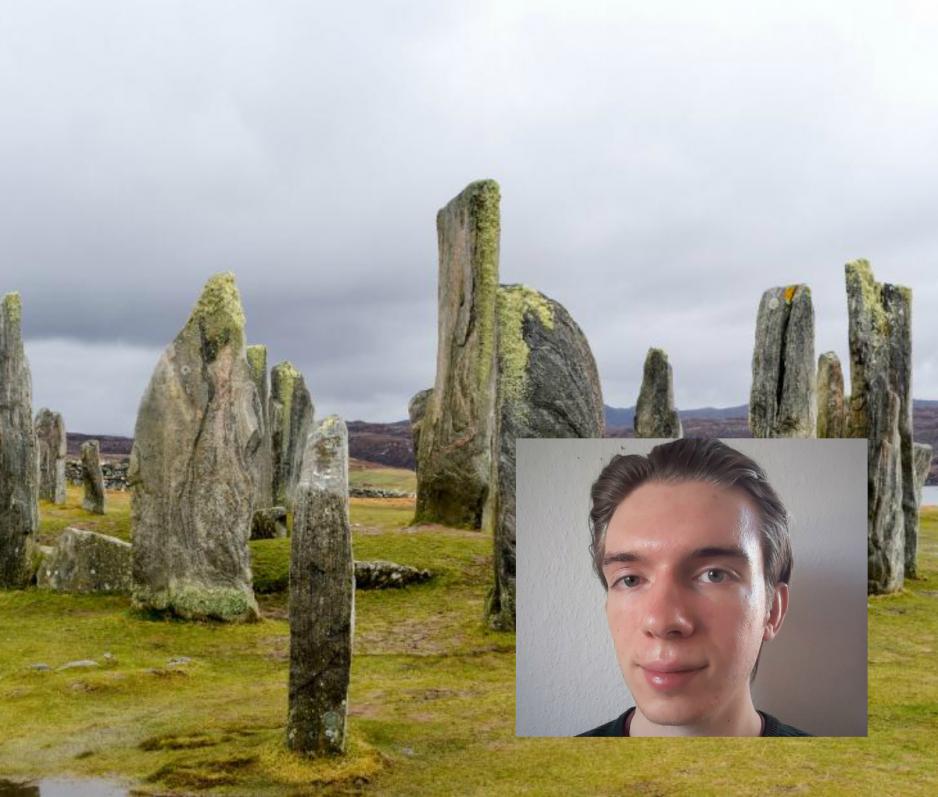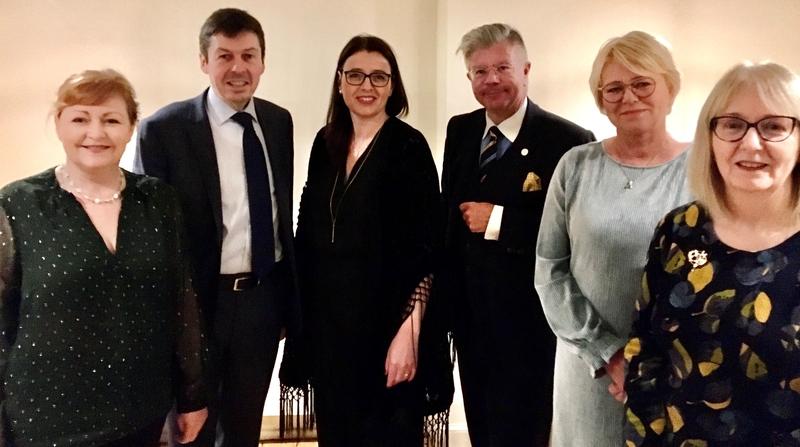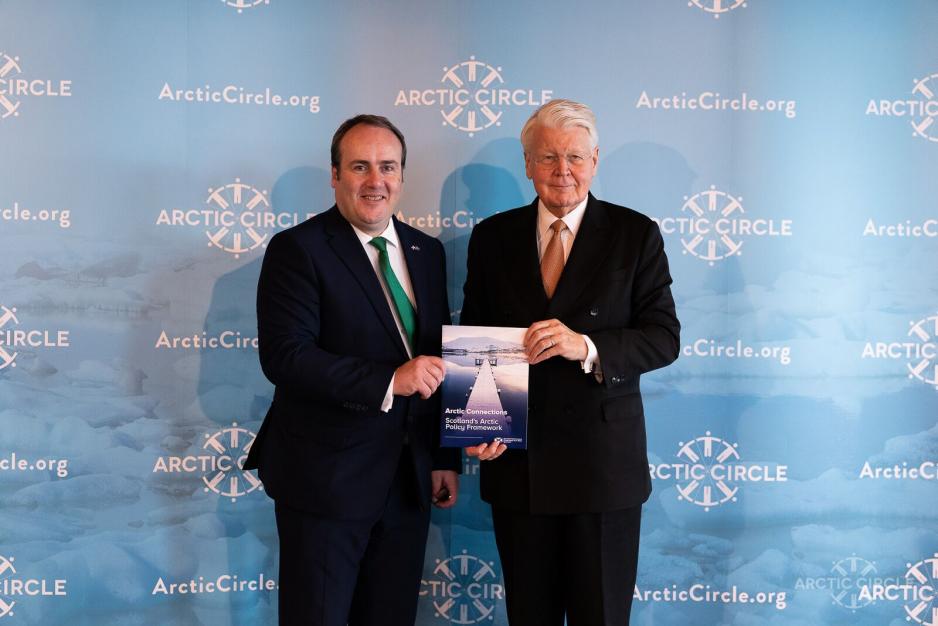Danish Historian Welcomes Scotland Back to Scandinavia

Historian Bjarke S. Drejer (inset) believes it is time to speak openly about the possibility of an independent Scotland in the EU and the Nordic Council. Photo of Callanish Stones, Isle of Lewis, Scotland. Photo: jbdodane/Flickr and private
Political commentators in Scotland jokingly say the country should «return to» Scandinavia post-Brexit. However, Danish historian Bjarke S. Drejer is not so sure the idea should be treated as a joke.
The day before Brexit took place, a delegation from the Presidency of the Nordic Council visited the Scottish parliament. There, they met with a.o. Ken Macintosh, who is Acting President of the Scottish Parliament.
There are close historic and cultural ties between Scotland and the Nordic countries, and the importance of continued cooperation was emphasized by both sides.
Establishing stronger ties to the north, in particular the Nordics and the North Atlantic, is considered a strategy for opening new doors now that Brexit has closed the traditional ones. And the Scottish parliament now seeks closer cooperation with the Nordic Council.
Wants to “take back” Scotland
However, Danish historian Bjarke S. Drejer pulls it even further in an op-ed in the Scottish paper The National.

The Nordic Council visited the Scottish parliament on 30 January. Emma Harper, Ken Macintosh, Silja Dögg Gunanrsdóttir, Hans Wallmark, Oddný Harðardóttir and Beatrice Wishart. Photo: Arne Fogt Bergby
“While many commentators have joked that Scotland should “come back” to Scandinavia, join the other Nordic countries on the Nordic Council, and sever ties to an England that refuses to listen to the wishes of the Scottish people, I am not sure it should be treated as a joke”, he writes.
Drejer, who is a historian specializing in international history, explains to High North News that he felt a need to take a closer look at the issue following his reading some joking political comments both in Scotland and also Denmark.
“The op-ed was meant as input to the debate, in which also Danish commentators are participating. Denmark and Scotland both border on the North Sea and many argue that Scotland should look to Denmark to a larger extent. In part because one does not want to lose the connection with Great Britain, but also because there are shared views”, he says.
In his op-ed, Drejer acknowledges the centuries-long history that the Scottish share with the British and also that in terms of language they share more. However, he argues, it is time to think anew.
“While the Scots were the ones to overwhelmingly vote to remain in the EU, the rest of the country had other plans. When Scotland voted on independence in 2014, the very real concerns over economy and currency in an independent Scotland seemed to sway the vote.”
Drejer argues that the economic argument against independence no longer is valid:
“I believe that an independent Scotland will fare far better than many think. Many look for the worst, though I am focused on looking for solutions, not just challenges”, he says.
I believe that an independent Scotland will fare far better than many think
In his op-ed, he quotes both Forbes and Bloomberg, both of whom have reported that Brexit is about to cost Great Britain more money in the form of lost economic growth alone, than the entire membership fee it has paid since becoming a member of the EU.
“It will not get better, no matter Boris what imagines. Frankly, I doubt that he cares whether the country gets poorer, as him and his own will do just fine. I have very little faith in his government’s ability to negotiate a satisfactory post-Brexit trade deal with the EU countries. All in all, Scottish independence is looking more attractive by the day.”
Opens new doors post-Brexit
In September last year, Scotland launched a new political framework in which the country promotes itself as “a European gateway to the Arctic”. In the document, the Scottish government promises even closer cooperation with its Arctic neighbors.
Also read
The reason behind the launching of “Arctic Connections” is twofold. First of all, Arctic countries are already major trade partners for Scotland and accounted for nearly 30 percent of foreign exports in 2017. Secondly, there is Brexit, which has caused and continues to cause much insecurity both inside as well as outside the borders of Britain. Brexit has received strong resistance in Scotland and the referendum demonstrated strong support for remaining a part of the EU in all Scottish electoral districts.
However, what is not so clear, is what Scotland wants in return, Alexandra Middleton writes in an analysis here at High North News.
Brexit issue on ministers’ meeting agenda
When the Nordic Council visited Scotland late January, issues on the agenda included, of course, Brexit, what it means to Scotland and its effect on cooperation with the Nordic countries and the EU.
“From a historic point of view, there have always been close ties between the Nordic countries, Scotland and the rest of Britain. The Nordic Council will do everything in its power to make sure this close cooperation continues. Despite Brexit, we want Scotland to know that she always has friends in the Nordics”, says the President of the Nordic Council, Silja Dögg Gunnarsdóttir in an article on the web pages of the Nordic Council.
Gunnarsdóttir led the delegation, which also consisted of Deputy President Oddný Harðardottir and member Hans Wallmark.
“I cannot stress enough how important it is for our countries to maintain close ties to the British isles. We would, of course, have preferred that Great Britain remain in the EU, however, we have to live with the realities of the situation and make the most of it”, Hans Wallmark said.
We would, of course, have preferred that Great Britain remain in the EU, however, we have to live with the realities
The Scottish hosts also emphasized the close ties between Scotland and the Nordic countries.
“Welcoming colleagues from the Nordic Council to the Scottish parliament today was truly a pleasure. The historic, cultural and geographical ties between us are already significant, and with an agenda covering everything from biological diversity to fake news, it is obvious that we also struggle with many of the same issues. I have every hope that our friendship will keep developing and blooming”, said the President of the Scottish parliament, Ken Macintosh.
Wants to talk about independence
Even though the Scots voted down independence in 2014, the Scottish National Party (SNP), which currently holds power, argues that Brexit has changed that calculation. They argue that the anti-independence campaigns misled voters by promising that voting to remain part of Great Britain was the only way to remain part of the EU.
Scottish Energy Minister Paul Wheelhouse said in an interview with High North News during the Arctic Circle conference in Reykjavik that “the chance of a second referendum appears all the more likely”.

Scottish Minister of Energy Paul Wheelhouse together with former Icelandic president Olafur Ragnar Grimsson to promote Scotland’s Arctic policy. Photo: Arctic Circle
Bjarke S. Drejer acknowledges that he is “a spokesperson for self-governance” and that he also supports and understands that Greenland wants independence from Denmark.
“Neither Scotland nor Greenland have economic or military self-governance, so in that respect their struggles for independence are comparable. However, an important difference is the fact that Scotland never has been subject to suppression from Great Britain in the way Greenland has from Denmark”, he says to High North News.
Also read
The historian believes it is time to speak up about the possibility of an independent Scotland in the EU and in the Nordic Council, not only because of the economy; the Scots share much with Scandinavians in terms of the way we live, nature and climate conditions, he argues in his op-ed, which says in closing:
“In the Nordic countries we are proud of our national identities. We are Danish, Swedish, Finnish, Norwegian, Icelandic, Greenlandic, Faroese and Åland Islander first, and Nordic second, and European third. We are sibling countries, but each of us forge our own path. When we meet out in the wider world, we feel a real sense of kinship. Perhaps one day we could add Scottish to that list.”
The op-ed has received more than 100 comments, some positive and some less so
This article was originally published in Norwegian and has been translated by HNN's Elisabeth Bergquist.





